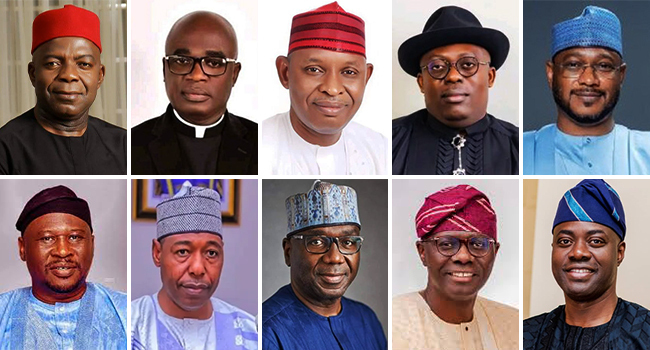...To get all news updates, Join our WhatsApp Group (Click Here)
Also Join our WhatsApp Channel (Click Here)
President Bola Tinubu will discuss the new national minimum wage with state governors at the 142nd meeting of the National Economic Council at the Aso Rock Villa, Abuja, on Thursday.
The President’s Chief of Staff, Femi Gbajabiamila, revealed plans for the unusual appearance when he spoke in Kano while leading a high-powered delegation to commiserate with Vice President Kashim Shettima over the demise of his mother-in-law.
Delivering the President’s condolence message to Vice President Shettima, Gbajabiamila disclosed that President Tinubu would be attending the scheduled NEC meeting held on Thursday, describing the plan as unusual.
“He is indeed saddened and he wished he was here with you. You know our President is very ubiquitous, he can be in a million places at the same time, but unfortunately, this bill, as you well know, calls for him to be at the seat of power.
“Indeed, he will be joining you tomorrow and that’s how important his presence in Abuja is right now. He will be joining you tomorrow at the NEC meeting, which he ever hardly attends, this might even be his first meeting,” Gbajabiamila said.
The meeting comes days after the Federal Executive Council, on Tuesday, stepped down the report of the Tripartite Committee on New National Minimum Wage down, citing the need for President Tinubu to further consult with other stakeholders on the matter.
They comprise state governors, local government authorities and the private sector.
Idris said the council deferred acting on the memo given that the Federal Government is not the sole stakeholder on the national minimum wage issue.
“That memo was stepped down to enable Mr President to consult further, especially with the state governors and the organized private sector, before he makes a presentation to the National Assembly before an executive bill is presented to the National Assembly.
“So I want to state that on the new national minimum wage, Mr President is going to consult further so that he can have an informed position because the new national minimum wage, as I said, is not just an issue of the federal government. It affects the state governments, it affects the local governments, it also affects the organised private sector, and that is why it is called the national minimum wage. It’s not just an affair of the federal government.
“So, Mr. President has studied the report and he’s going to consult wider before a final submission is being made to the National Assembly,” Idris said.
The Federal Government, Organised Private Sector and Labour had held several meetings on the new minimum wage with the NLC and Trade Union Congress leaders insisting on N250,000.
On the other hand, the Federal Government, states and the OPS made a counter-offer of N62,000. However, the state governors argued that they would not sustain any minimum wage higher than N60,000.
NEC was established by the provisions of section 153(1) and Paragraphs 18 & 19 of part I of the Third Schedule of the 1999 Constitution (as amended).
Its membership comprises the 36 state governors, the Governor of the Central Bank, and other co-opted government officials.
Chaired by the Vice President, the council meets monthly to execute its mandate of “advising the President concerning the economic affairs of the Federation, and in particular on measures necessary for the coordination of the economic planning efforts or economic programmes of the various Governments of the Federation.”
You can get every of our news as soon as they drop on WhatsApp ...To get all news updates, Join our WhatsApp Group (Click Here)
Also Join our WhatsApp Channel (Click Here)

















